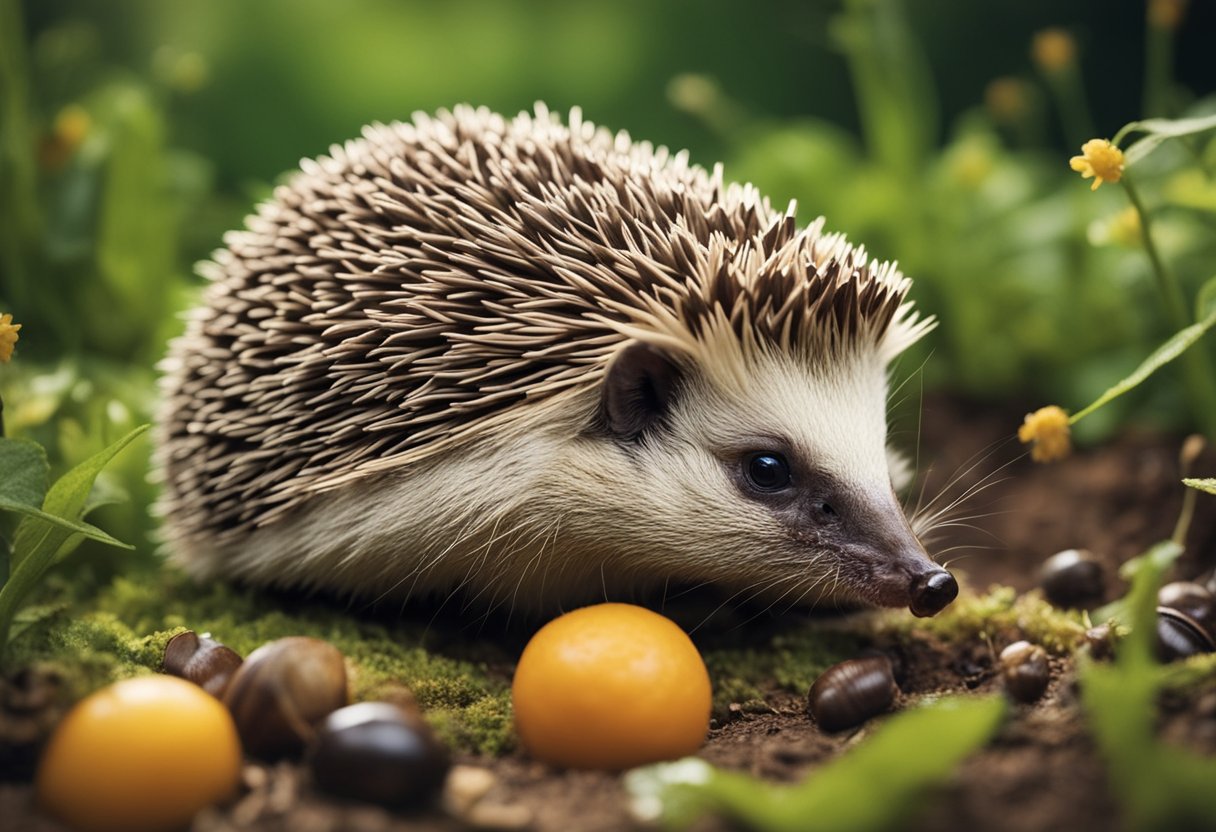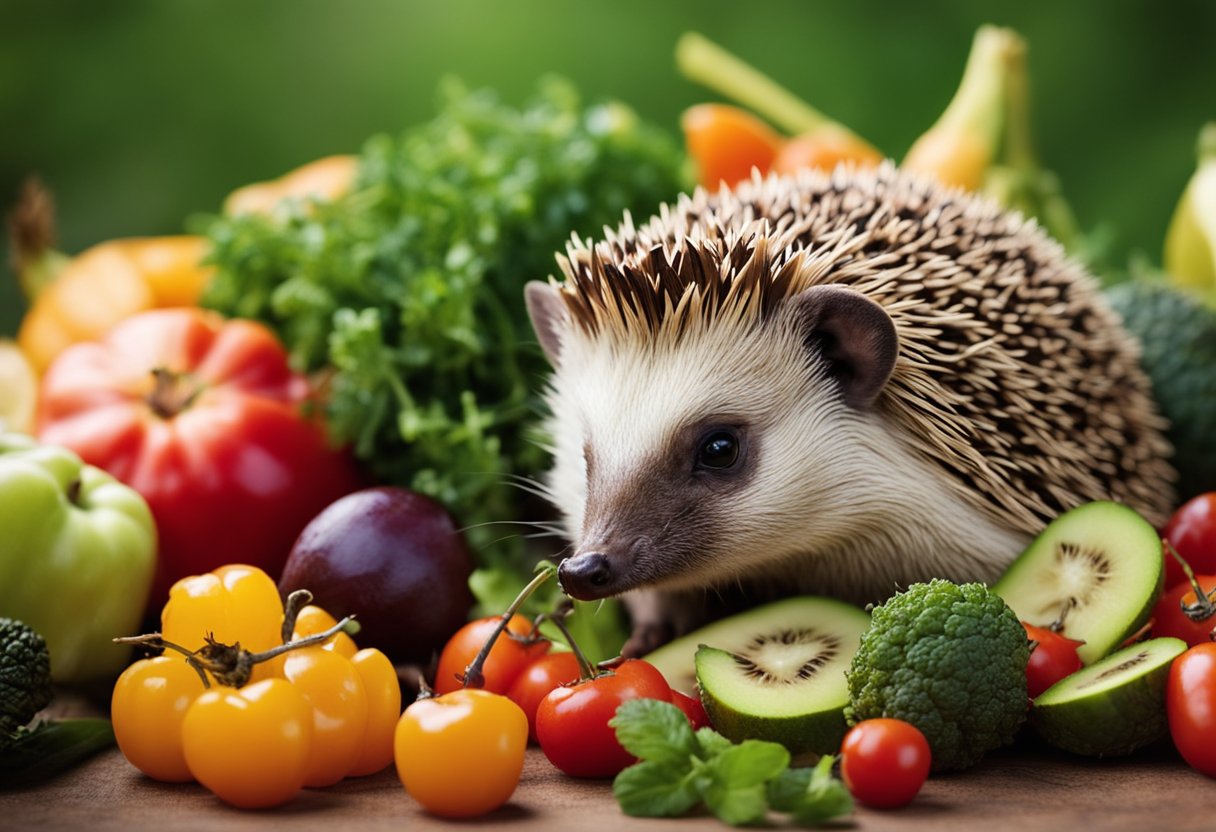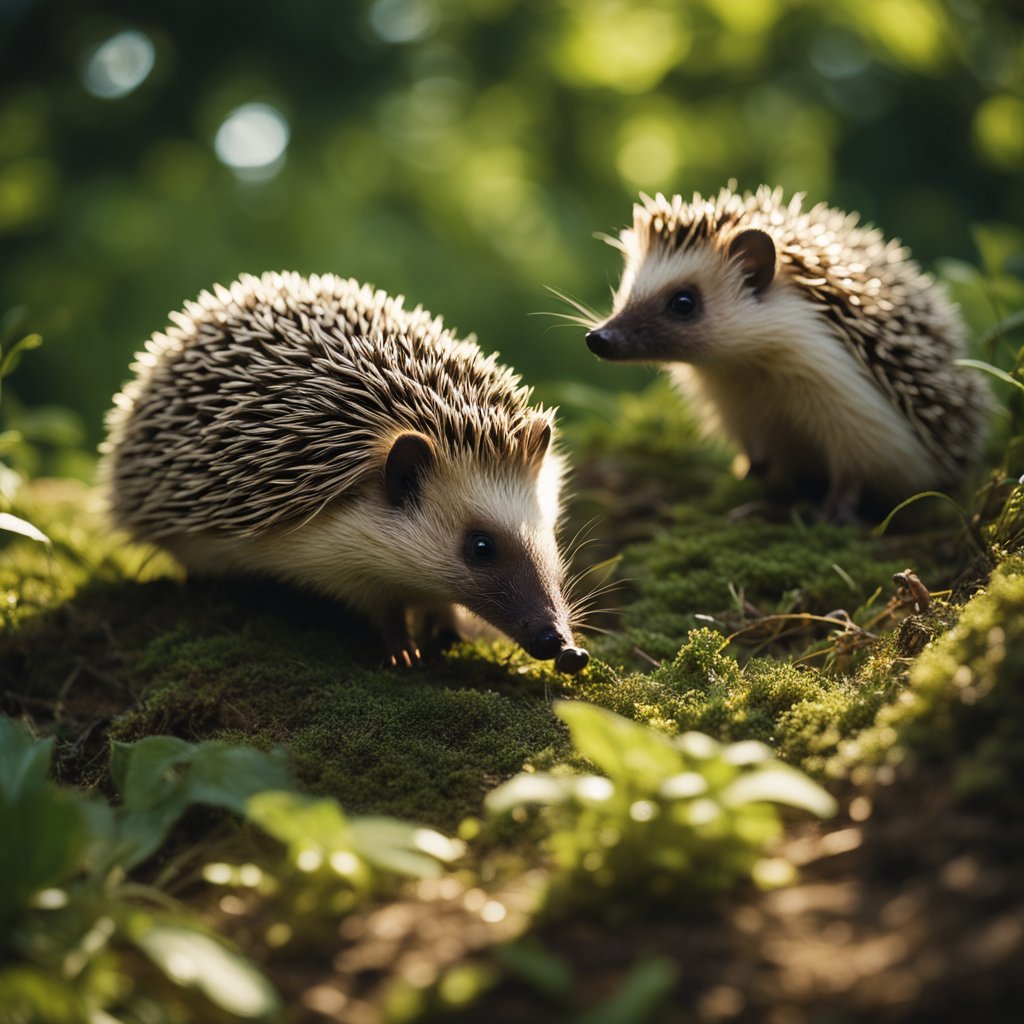What Do Hedgehogs Eat: A Comprehensive Guide
Hedgehogs are adorable creatures that are native to Europe, Asia, and Africa. They are known for their spiky exterior and their tendency to curl up into a ball when they feel threatened. If you are considering adopting a hedgehog as a pet, it is essential to understand what they eat to ensure they remain healthy and happy.

Hedgehogs are omnivores, which means they eat both plant and animal matter. In the wild, they primarily feed on insects, snails, worms, and other small invertebrates. They will also eat some fruits, vegetables, and berries. In captivity, it is important to provide a balanced diet that meets all their nutritional needs.
Key Takeaways
- Hedgehogs are omnivores and eat both plant and animal matter.
- In the wild, they primarily feed on insects, snails, and worms.
- In captivity, it is important to provide a balanced diet that meets all their nutritional needs.
Hedgehog Diet Basics
If you are a new hedgehog owner, you might be wondering what to feed your pet. Hedgehogs are insectivores, which means their natural diet consists mostly of insects and other small invertebrates. However, they also eat fruits, vegetables, and grains in the wild.
Natural Diet
In the wild, hedgehogs eat a variety of insects, including beetles, caterpillars, and crickets. They also eat earthworms, slugs, and snails. Hedgehogs use their keen sense of smell and hearing to locate prey, and they are opportunistic feeders. This means they will eat whatever is available to them.
Nutritional Needs
Hedgehogs require a balanced diet to stay healthy. In captivity, you can feed your hedgehog a combination of commercial hedgehog food, insects, and fresh fruits and vegetables. Commercial hedgehog food is specially formulated to meet the nutritional needs of hedgehogs, but it should not be the only thing your hedgehog eats.
Insects such as mealworms, crickets, and waxworms are a great source of protein for hedgehogs. You can also feed your hedgehog small amounts of fresh fruits and vegetables, such as apples, bananas, carrots, and green beans. However, it’s important to avoid feeding your hedgehog foods that are high in sugar or fat, as these can lead to obesity and other health problems.
Overall, a balanced diet that includes a variety of foods is essential for your hedgehog’s health and well-being. Consult with your veterinarian or an experienced hedgehog owner for specific dietary recommendations for your pet.
Feeding Hedgehogs in Captivity
Hedgehogs are omnivores and require a balanced diet to stay healthy. In captivity, feeding hedgehogs can be relatively easy if you know what they need. In this section, we’ll discuss the different types of food that are appropriate for hedgehogs in captivity.
Commercial Hedgehog Food
Commercial hedgehog food is a convenient option for pet owners because it is specially formulated to meet the nutritional needs of hedgehogs. These foods are typically high in protein and low in fat, which is important for maintaining a healthy weight. Look for brands that contain high-quality ingredients and avoid those that contain fillers or artificial preservatives. Some popular brands of commercial hedgehog food include Mazuri, Sunseed, and Higgins.
Supplemental Foods
While commercial hedgehog food should make up the bulk of your hedgehog’s diet, it’s also important to offer a variety of supplemental foods to keep them healthy and happy. Some good options include cooked chicken, boiled eggs, and small amounts of fruits and vegetables. Mealworms and crickets can also be offered as treats, but should not make up a significant portion of your hedgehog’s diet.
Foods to Avoid
There are certain foods that should be avoided when feeding hedgehogs. These include dairy products, sugary or salty foods, and foods that are high in fat. In addition, hedgehogs should not be fed anything that is toxic to them, such as chocolate, caffeine, or avocado. If you’re unsure about whether a particular food is safe for your hedgehog to eat, it’s best to err on the side of caution and avoid it altogether.
In summary, feeding hedgehogs in captivity requires a balanced diet that includes commercial hedgehog food, supplemental foods, and avoiding toxic or unhealthy foods. By providing your hedgehog with a healthy diet, you can help ensure that they live a long and happy life.
Feeding Practices and Schedule
Feeding Frequency
Hedgehogs are nocturnal animals and prefer to eat at night. Therefore, it is best to feed them once a day in the evening. This will align with their natural foraging behavior. It is important to establish a feeding pattern by offering food at the same time each day. This will help your hedgehog get into a routine and prevent overfeeding or underfeeding.
Portion Control
Hedgehogs typically consume 1-2 tablespoons of food daily. It is important to monitor your hedgehog’s appetite and adjust the portion accordingly. You should avoid overfeeding or underfeeding your hedgehog. Overfeeding can lead to obesity, which can cause health problems. On the other hand, underfeeding can lead to malnutrition and other health problems.
It is important to provide your hedgehog with a balanced diet. A typical diet includes insects, such as mealworms and crickets, as well as fruits and vegetables. You can also provide your hedgehog with commercial hedgehog food, which is specifically formulated to meet their nutritional needs.
In addition to food, your hedgehog should have access to plenty of fresh, clean water at all times. A healthy hedgehog should drink somewhere in the vicinity of 1 ½ to 2 ½ tablespoons of water every day. You should replace the water in their dish at least once a day.
By establishing a feeding schedule and practicing portion control, you can ensure that your hedgehog stays healthy and happy.
Health Considerations

Diet-Related Health Issues
Hedgehogs have specific dietary requirements that need to be met to keep them healthy. Feeding your hedgehog a poor diet can lead to various health issues, such as obesity, malnutrition, and dental problems.
Obesity is a common problem in pet hedgehogs that are fed a high-fat diet. This can lead to a range of health issues, including heart disease, liver disease, and diabetes. To prevent obesity, it’s important to feed your hedgehog a balanced diet that is low in fat and high in protein.
Malnutrition is another issue that can arise from feeding your hedgehog an inappropriate diet. A diet that is low in protein or lacks essential vitamins and minerals can lead to malnutrition. Signs of malnutrition include lethargy, weight loss, and a dull coat. To prevent this, it’s important to feed your hedgehog a varied diet that includes a range of protein sources, fruits, and vegetables.
Dental problems are also common in hedgehogs that are fed a poor diet. A diet that is high in sugar or lacks fiber can lead to dental issues such as tooth decay, gum disease, and tooth loss. To prevent dental problems, it’s important to feed your hedgehog a diet that is low in sugar and high in fiber.
Monitoring Dietary Health
To ensure that your hedgehog is healthy, it’s important to monitor their dietary health regularly. This can be done by observing their behavior, weight, and overall health. If you notice any changes in your hedgehog’s behavior or health, it’s important to consult a veterinarian.
One way to monitor your hedgehog’s dietary health is to weigh them regularly. A sudden change in weight can be a sign of a health issue, such as obesity or malnutrition. It’s also important to observe your hedgehog’s behavior and energy levels. A healthy hedgehog should be active and alert.
In addition to monitoring your hedgehog’s behavior and weight, it’s important to provide them with a varied and balanced diet. This should include a range of protein sources, such as insects and meat, as well as fruits and vegetables. It’s also important to avoid feeding your hedgehog foods that are high in sugar or fat.
By monitoring your hedgehog’s dietary health and providing them with a balanced diet, you can help ensure that they remain healthy and happy.
Resources
Now that you know what hedgehogs eat, it’s important to ensure that you are providing them with a balanced diet. As with any pet, it’s always best to consult with a veterinarian or a reputable source for guidance on feeding your hedgehog.
Here are some resources that can help you learn more about what to feed your hedgehog:
- PetKeen has a comprehensive guide on what to feed hedgehogs, including a list of safe and unsafe foods.
- The Spruce Pets provides a list of fruits, vegetables, and protein sources that hedgehogs can eat.
- The Woodland Trust has an informative article on what hedgehogs eat in the wild and how to supplement their diet in captivity.
- Hedgehog World offers a complete food and diet list for hedgehogs, as well as tips on how to feed them.
Remember to always provide fresh water for your hedgehog and avoid feeding them foods that are high in sugar or fat. With the right diet and care, your hedgehog can live a happy and healthy life.
Conclusion
In conclusion, hedgehogs are omnivores and their diet consists of both plants and invertebrates. They consume a wide variety of foods in the wild including fruits, seeds, nuts, insects, spiders, worms, and other small animals. As pets, they require a balanced diet that includes protein and fiber.
When feeding your pet hedgehog, it is important to provide them with a variety of foods. You can feed them commercial hedgehog food, which is specially formulated for their nutritional needs. Additionally, you can supplement their diet with fresh fruits and vegetables, cooked chicken, and insects such as mealworms and crickets.
It is important to note that some foods are toxic to hedgehogs and should be avoided. These include avocado, chocolate, caffeine, and dairy products. Additionally, foods high in fat and sugar should be given in moderation.
Overall, providing your hedgehog with a nutritious and balanced diet is essential for their health and well-being. By following these guidelines, you can ensure that your pet hedgehog is getting the nutrients they need to thrive.
Frequently Asked Questions
Can hedgehogs eat cabbage?
Yes, hedgehogs can eat cabbage in moderation. However, cabbage should not be the primary food in their diet. It is important to note that hedgehogs are primarily insectivores, so their diet should consist mainly of insects. Vegetables and fruits should only be given as treats.
Can hedgehogs eat pineapple?
No, hedgehogs should not eat pineapple. Pineapple is high in sugar and acidity, which can cause digestive problems for hedgehogs. It is best to avoid giving pineapple to hedgehogs.
Can hedgehogs eat strawberries?
Yes, hedgehogs can eat strawberries in moderation. Strawberries are a good source of vitamin C, which is important for hedgehogs. However, strawberries are also high in sugar, so they should be given as a treat and not as a primary food.
Can hedgehogs have carrots?
Yes, hedgehogs can have carrots in moderation. Carrots are a good source of vitamin A, which is important for hedgehogs. However, carrots are also high in sugar, so they should be given as a treat and not as a primary food.
Which vegetables are part of a healthy diet for hedgehogs?
Hedgehogs can eat a variety of vegetables, but they should only be given as treats. Some good options include green beans, peas, and sweet potatoes. It is important to avoid vegetables that are high in sugar or acidity, such as tomatoes and onions.
Do hedgehogs have a natural prey, such as insects or small animals?
Yes, hedgehogs are primarily insectivores and their natural prey includes worms, beetles, slugs, and other small invertebrates. They may also eat small animals such as mice and frogs. It is important to provide a varied diet that includes insects as the main food source for hedgehogs in captivity.
More FAQs
Can Hedgehogs Eat Lettuce?
Yes, hedgehogs can eat lettuce, but it should not be a regular part of their diet. Lettuce is low in nutritional value and high in water content, which can cause digestive problems for hedgehogs. If you do give your hedgehog lettuce, make sure to wash it thoroughly and remove any pesticides or chemicals that may be on it.
Can Hedgehogs Eat Celery?
Yes, hedgehogs can eat celery, but it should be given in moderation. Celery is high in fiber and can cause digestive problems if given in large amounts. It is best to chop the celery into small pieces and mix it with other vegetables or fruits to make a balanced meal for your hedgehog.
Can Hedgehogs Eat Fruit?
Yes, hedgehogs can eat fruit, but it should be given in moderation. Fruits are high in sugar and can cause health problems if given in large amounts. It is best to give your hedgehog small amounts of fruits such as apples, bananas, and berries as a treat.
What Animals Eat Hedgehogs?
Hedgehogs have a few natural predators, including foxes, badgers, and birds of prey. Domestic dogs and cats may also attack and kill hedgehogs. To protect your pet hedgehog, make sure to keep it indoors or in a secure outdoor enclosure.
Do Hedgehogs Eat Mice?
No, hedgehogs do not eat mice. Hedgehogs are insectivores and primarily eat insects, worms, and other invertebrates. They may occasionally eat small vertebrates such as frogs or lizards, but mice are not a part of their natural diet.
See also : 5 tips for a healthier pet
